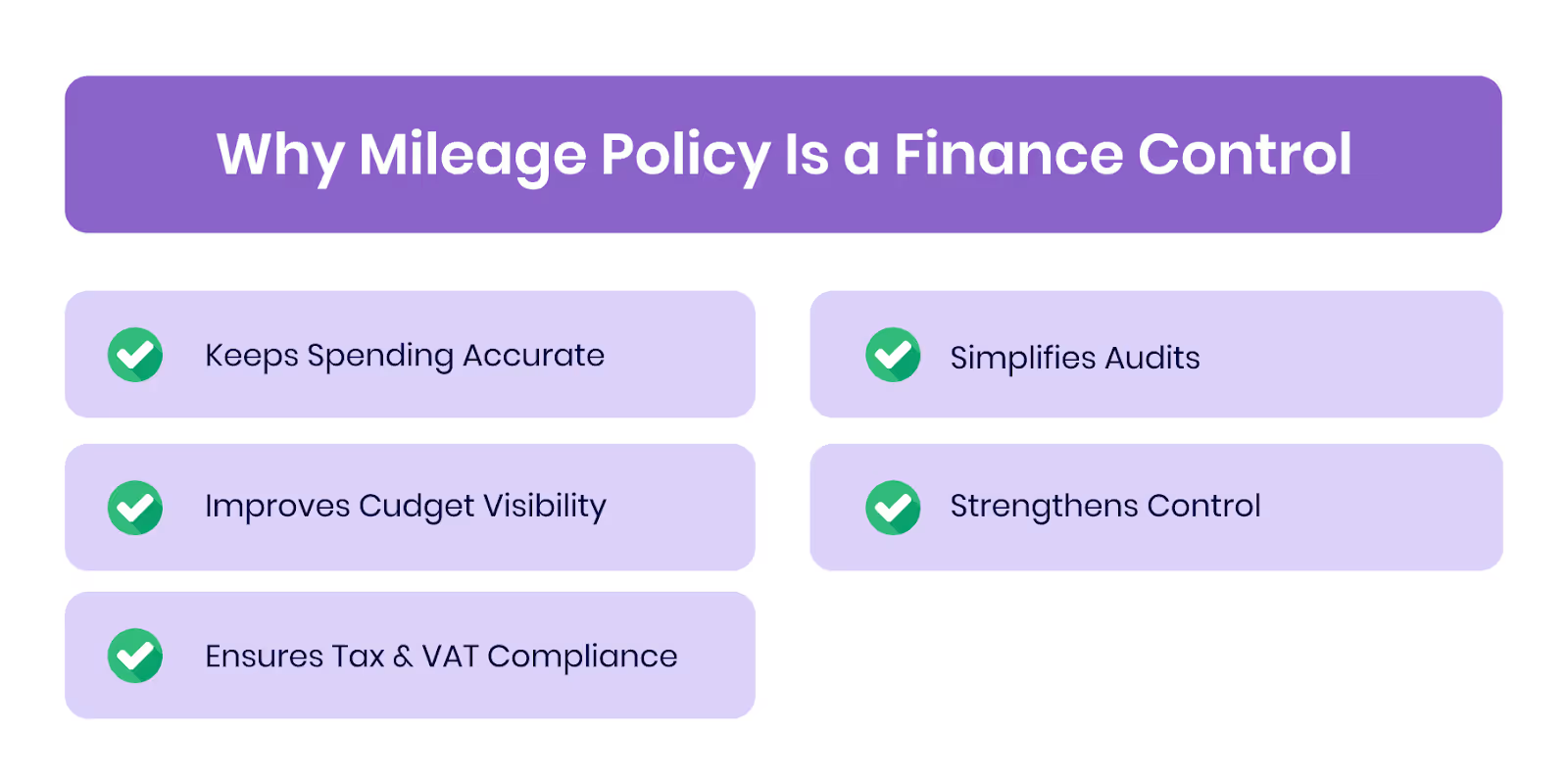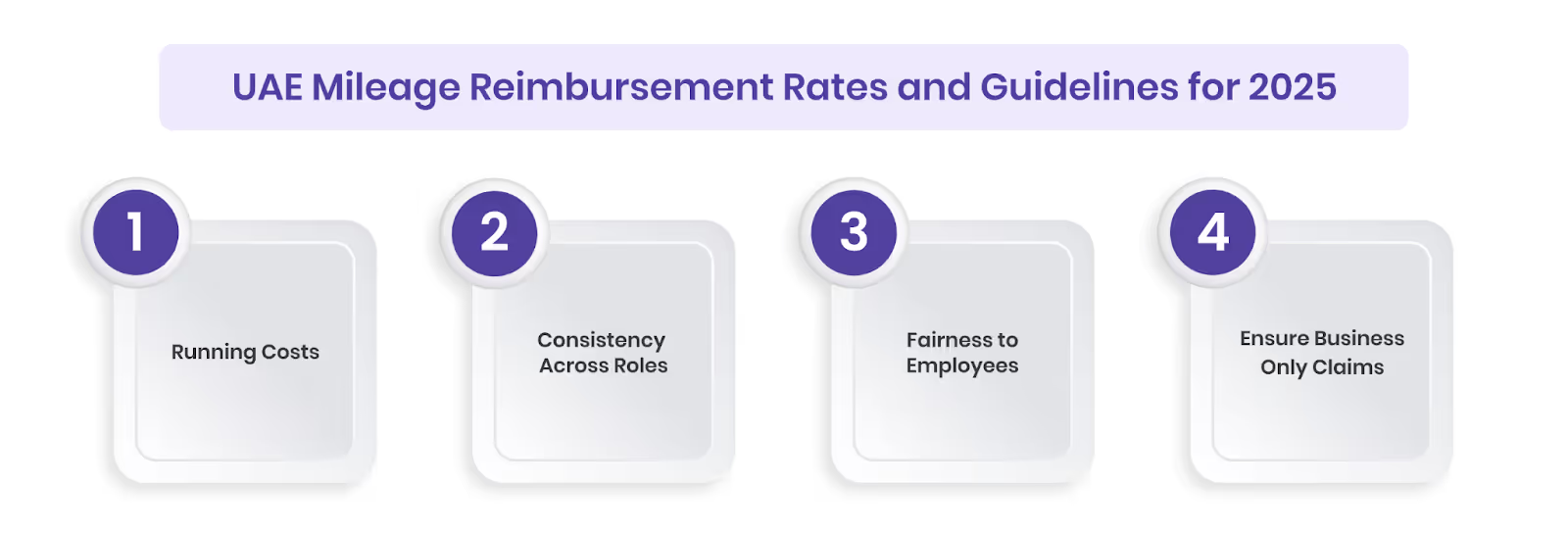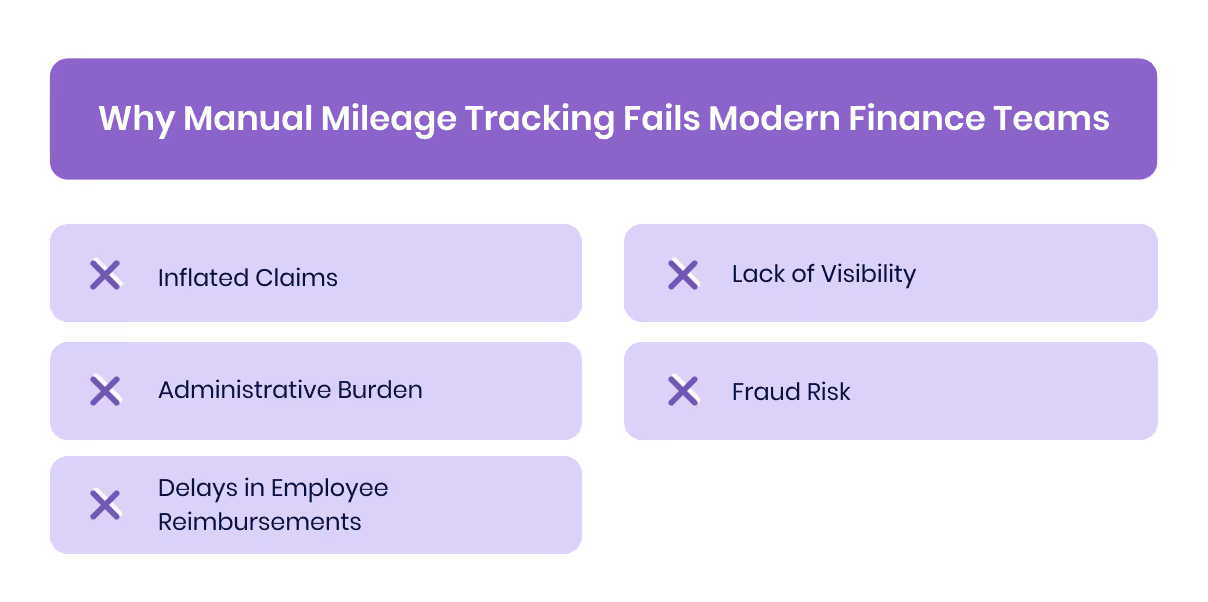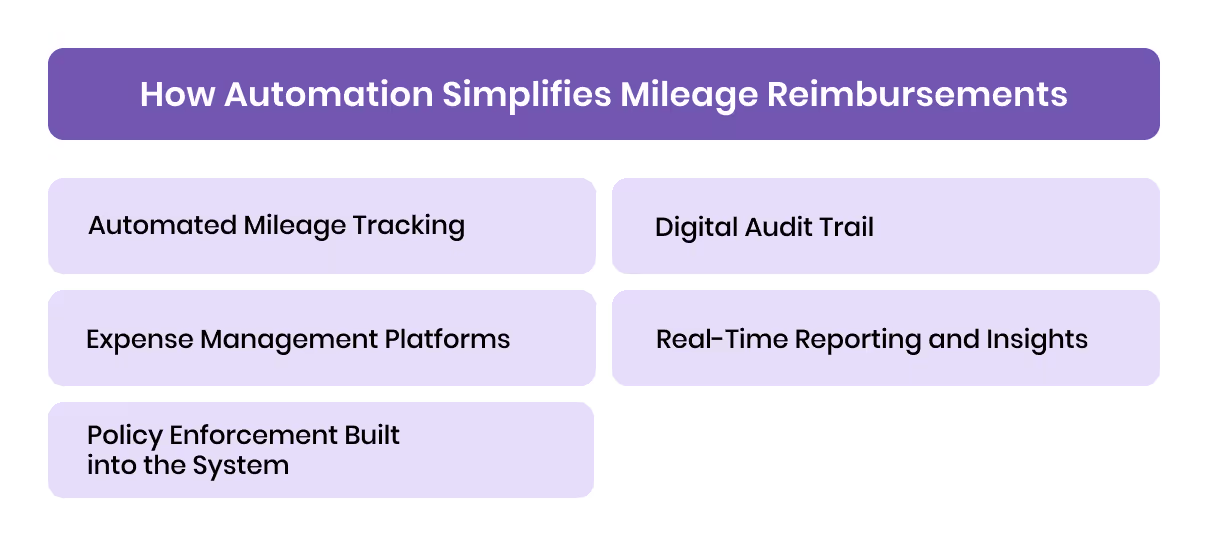Mileage reimbursement may look like a small line item, but it sits within a much larger picture. Global business travel spending was forecasted to reach $1.64 trillion (around AED 6.02 trillion) in 2025 (GBTA, 2023), and without a clear company mileage reimbursement policy, a significant portion of these expenses can go unchecked.
Companies that lack a structured approach often face overclaimed mileage, compliance risks, and wasted hours reconciling expenses. These challenges grow as business travel rebounds and employee mobility increases.
This article will walk you through everything you need to know about creating a company mileage reimbursement policy in 2025.
Key Takeaways:
- Policy Purpose – A clear mileage policy turns ad-hoc reimbursements into deductible, auditable expenses.
- UAE Compliance – The UAE does not prescribe statutory mileage rates. Claims must be “wholly and exclusively” for business, with VAT-compliant invoices and TRNs.
- Controls – GPS logs or corporate-card-backed receipts plus a clear trip purpose reduce inflated claims and ensure quick auditability. Automation reduces manual review significantly.
- Implementation – Launch a 90-day pilot covering policy, tracking, approvals, and reporting. Monitor KPIs like claims per FTE, processing time, and exception rates.
- Employee Experience – Timely reimbursement increases compliance. Mobile receipt capture, instant approvals, and automation reduce friction.
Why Mileage Policy Is a Finance Control (Not HR Admin)

Mileage reimbursement may look like an HR task, but it directly impacts cost control, tax compliance, and audit accuracy. For finance teams, it's a small process with big financial consequences.
- Keeps spending accurate: Without a set policy, mileage claims can be inconsistent or inflated. Finance can only manage what it can measure, clear rules make sure every dirham reimbursed reflects real travel.
- Improves budget visibility: Mileage is a recurring cost for many UAE companies, especially those with sales or field staff. Tracking it properly helps finance teams forecast and plan travel budgets more accurately.
- Ensures tax and VAT compliance: The UAE allows deductions only for business-related expenses. Proper mileage logs, receipts with TRN, and a valid business purpose are what make these costs deductible.
- Simplifies audits: Auditors often check travel and reimbursement records first. A finance-led mileage policy ensures claims are well-documented, easy to trace, and compliant with VAT rules.
- Strengthens control: When finance owns the process, approvals, limits, and documentation standards stay consistent across the company. This reduces errors and keeps reimbursements under control.
When finance takes charge, mileage reimbursement leads to cleaner books, faster closes, and better cost discipline.
UAE Mileage Reimbursement Rates and Guidelines for 2025

Unlike other jurisdictions, the UAE does not prescribe an official mileage reimbursement rate. This means companies have the flexibility to set their own allowance, provided it is fair, consistently applied, and backed by proper documentation.
What matters most is aligning the policy with the UAE Corporate Tax and VAT requirements.
Key Guidelines for UAE Businesses
- Running Costs: Factor in fuel, insurance, and vehicle maintenance when deciding the allowance per kilometre. Many firms benchmark against global averages but tailor them to UAE fuel prices and local conditions.
- Consistency Across Roles: Apply the same rate across the workforce, unless specific roles (e.g., frequent travel vs. occasional trips) justify exceptions.
- Fairness to Employees: A rate that is too low discourages compliance; a rate that is too high inflates costs. A balanced approach builds trust.
- Ensure Business-Only Claims: Under the UAE Corporate Tax Law, only expenses incurred "wholly and exclusively" for business are deductible. If trips combine personal and business purposes, only the business portion can be claimed.
Manual mileage tracking and reimbursements can slow down financial workflows and increase compliance risks. Move to a smarter, automated system that handles reimbursements, approvals, and accounting in one place.
Automate Accounting with Alaan
Also Read: Complete Guide to Expense Reimbursement
Accurate Mileage Calculation & Tracking: Best Practices
Once a company sets its mileage reimbursement rate, the next challenge is ensuring that claims are accurate and compliant. Clear calculation and tracking methods not only reduce errors but also help finance teams stay audit-ready.
Common Methods for Recording Mileage
- Odometer Readings: Employees record the starting and ending odometer readings for each business trip. This method is straightforward but relies heavily on employee honesty and consistent reporting.
- Fuel Receipts: Fuel invoices can support mileage claims, provided they are VAT-compliant and clearly linked to the trip. However, receipts alone cannot prove distance travelled, so they should be paired with a mileage log.
- Digital Logs and GPS Tracking: GPS-enabled apps and mileage trackers automatically calculate distance and generate reports. These digital logs reduce the risk of inflated claims and are easier to integrate with expense systems.
Key Compliance Requirements in the UAE
- Trip Details: Logs should include the date, start and end point, total distance, and the purpose of travel.
- VAT-Compliant Documentation: Where fuel or other VAT-related costs are reimbursed, employees must provide valid invoices with TRN and VAT breakdown.
Practical Example
A sales representative drives 120 km to attend a client meeting in Abu Dhabi.
- The employee records the odometer readings (e.g., 15,230 km → 15,350 km).
- A fuel receipt with TRN and VAT details is uploaded.
- The purpose of the trip (“Client meeting – Abu Dhabi branch”) is logged.
- The finance team can now approve the claim confidently, knowing both distance and compliance requirements are met.
[cta-4]
Why Manual Mileage Tracking Fails Modern Finance Teams

Manual mileage tracking may seem manageable for a small team, but for growing businesses, it quickly becomes a drain on time, accuracy, and compliance. What used to be a simple spreadsheet exercise now exposes finance teams to complex issues.
Common challenges include:
- Inflated Claims: Without automated verification, employees may unintentionally overestimate distances, leading to higher reimbursement costs.
- Administrative Burden: Finance teams spend hours at month-end reconciling mileage claims, checking logs, and matching receipts, time that could be spent on higher-value tasks.
- Delays in Employee Reimbursements: Manual processing often pushes reimbursements into the next payroll cycle, creating frustration and reducing employee trust.
- Lack of Visibility: Finance leaders struggle to get real-time insights into travel costs, making it harder to forecast budgets or spot inefficiencies.
- Fraud Risk: Without digital verification, duplicate or exaggerated claims can slip through unnoticed, driving up costs.
Manual mileage tracking drains productivity and weakens control. Automated systems replace guesswork with data accuracy, faster approvals, and end-to-end VAT compliance.
Also Read: Expense Reimbursements: What's the Ideal Way to Handle Them?
How Automation Simplifies Mileage Reimbursements

Mileage reimbursement is a recurring business expense that directly affects budgets, compliance, and audit readiness.
For UAE finance teams, relying on spreadsheets or manual logs introduces errors, delays, and risks. The right digital tools give full control over spending and compliance while saving time.
- Automated Mileage Tracking: GPS-based apps capture actual trip distances automatically. This eliminates guesswork, prevents overclaims, and provides the finance team with verified data for faster approvals and audits.
- Expense Management Platforms: In the UAE, where employees can lose over 1 hour each month to complex expense claims (≈ AED 13,000/year in productivity costs), digital platforms like Alaan make processes faster and audit-ready. These platforms combine mileage logs, receipts, and approvals in a single system.
- Policy Enforcement Built into the System: Companies can define per-kilometre rates, approval limits, and eligibility rules upfront. Claims that do not meet policy criteria are flagged automatically, reducing errors and ensuring control without manual intervention.
- Digital Audit Trail: Every trip, receipt, and approval is stored digitally. Finance teams can retrieve complete documentation instantly for VAT audits or corporate tax reviews, avoiding lost receipts or incomplete records.
- Real-Time Reporting and Insights: Dashboards provide visibility into total mileage spend, high-cost departments, and policy exceptions. Finance can spot trends, adjust budgets, and take proactive measures to optimise costs rather than reacting at month-end.
Modern digital tools turn mileage reimbursement from a slow, error-prone process into a controlled, transparent, and compliant workflow. Finance teams save time, enforce policies consistently, and maintain complete oversight of travel expenses.
With Alaan, this efficiency extends further, transforming manual reimbursements into a unified, automated system that simplifies tracking, control, and reporting.
Turning Mileage Claims into a Transparent, Audit-Ready Process
At Alaan, we provide an AI-powered spend management platform that streamlines every step of the process, ensuring accuracy, compliance, and transparency.
- Corporate Cards for Direct Payments: Employees use Alaan corporate cards to pay for fuel and transport. Instant issuance, top-ups, and spending limits reduce manual claims and give finance teams full control.
- Real-Time Tracking & Reporting: Monitor all transport expenses in real time. Centralised dashboards and AI insights highlight unusual spending, optimise budgets, and enforce policy compliance.
- AI-Powered Receipt Capture: Upload receipts via the app or Chrome extension. Alaan extracts key data, distance, date, vendor, amount, matches it to transactions, flags duplicates, and ensures VAT compliance automatically.
- Custom Approval Workflows: Set approval rules by role. Junior employees may require two approvals, senior staff only one. Workflow automation ensures faster, consistent approvals.
- VAT Compliance Simplified: Alaan Intelligence verifies receipts for correct TRN, invoice details, and VAT amounts. Employees get automated reminders to submit VAT-compliant invoices, reducing errors and saving time.
Book a Demo Now and see how we can help you simplify mileage reimbursement
Conclusion
A clear company mileage reimbursement policy is essential for accuracy, compliance, and employee satisfaction. Manual tracking is slow, error-prone, and creates friction. Alaan gives you total control over spending and expense tracking through our intelligent platform, automating receipt matching, approvals, and reconciliation.
- AED 150M+ savings: Delivered through cashback and smarter spend control.
- #1 in MENA: Ranked top for Expense Management in G2’s Spring 2024 reports.
Experience faster, compliant, and fully transparent mileage reimbursement with Alaan.
[cta-1]
FAQs
1. What is a company mileage reimbursement policy?
A company mileage reimbursement policy is a formal guideline that outlines how employees are compensated for using personal vehicles for business purposes. It ensures fair payment, compliance, and accurate record-keeping.
2. What are the UAE mileage reimbursement rates in 2025?
Companies can set reimbursement rates based on fuel costs, vehicle type, or distance travelled. Alaan helps track all mileage expenses, ensuring accurate reporting and VAT compliance.
3. Can employees submit mileage expenses digitally?
Yes. With Alaan, employees can upload receipts and mileage logs via the mobile app or browser extension. AI-powered processing matches receipts to transactions for fast, error-free reimbursements.
4. How do approval workflows work for mileage claims in Alaan?
Alaan allows companies to create custom approval workflows. Junior employees may require multiple approvals, while senior staff might need just one, ensuring faster and consistent processing.
5. Why should businesses use a mileage reimbursement tool instead of manual tracking?
Manual tracking is prone to errors, delays, and VAT compliance issues. Alaan centralises expense management, automates verification, and provides real-time visibility for better control and reporting.


.avif)


.avif)




%201.avif)